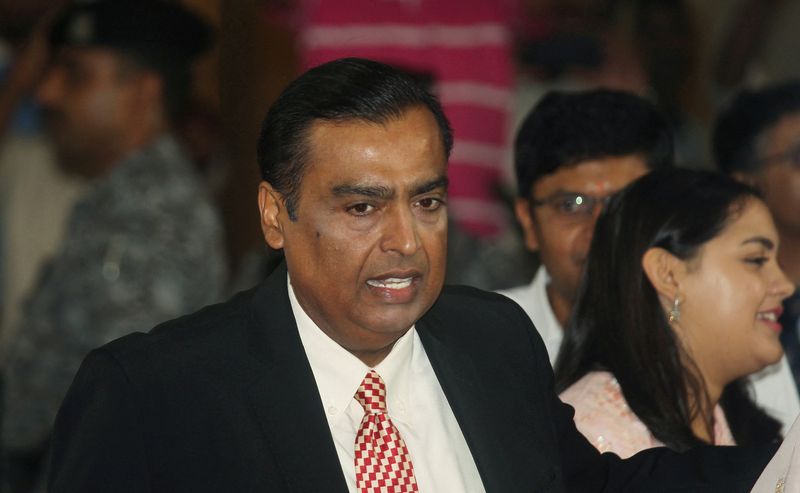By Munsif Vengattil, Aditya Kalra and Aditi Shah
NEW DELHI (Reuters) – Having just lost the battle with Elon Musk over how India's satellite spectrum is allocated, Asia's richest man Mukesh Ambani could face a bigger challenge if Musk's Starlink launches services in India and the two compete against each other over the prize.
The Indian government said on Tuesday it will allocate spectrum for satellite broadband administratively and not through an auction, hours after Musk criticized the auction route sought by rival billionaire Ambani as “unprecedented”.
Musk's Starlink, a unit of SpaceX with 6,400 active satellites orbiting Earth to provide low-latency broadband to 4 million customers, has publicly expressed interest in launching in India, but the plans have repeatedly encountered obstacles from the regulations.
Ambani, who heads India's largest telecom company Reliance Jio, had been trying to create a “balanced competitive landscape” since last year and wanted to keep Musk at bay as experts say a spectrum auction would have required much more investment and deterred foreign players .
Reliance, which has dominated India's telecom sector for years, now worries that after spending $19 billion on radio auctions, it risks losing broadband customers to Musk, and possibly even data and voice customers later as the technology advances, it said a person with direct knowledge Thursday. .
The Indian government says its decision to administratively allocate spectrum to anyone who applies for it is in line with global trends.
It has not yet set a timetable for when the process will start, but Musk's Starlink has already applied for the necessary permits. Starlink's entry into the Indian market would create a new battleground between the two billionaires: pricing.
Musk has thousands of operational satellites, while Reliance has partnered with Luxembourg-based SES Astra, whose nonprofit CelesTrak says it has 38 satellites that Reliance plans to use.
“Starlink can price aggressively because it doesn't have to add more satellites,” said Tim Farrar, satellite industry analyst at U.S.-based TMF Associates.
Ambani once gave free data on his mobile plans, but Musk is no stranger to such tactics that can upset local players.
In Kenya, Musk priced Starlink at $10 per month, versus $120 in the United States, with rental plans available for higher hardware costs. Kenyan Safaricom filed a complaint with local regulators in July, calling on players like Starlink to collaborate with mobile networks and not operate independently.
INDIA POTENTIAL
In India, a Reliance Jio fiber-based high-speed broadband plan costs $10 per month, with the router free on long-term plans. It has a 30% share of the wired broadband market.
Starlink plans to initially offer an unlimited internet data plan in India and target business customers, a second industry source familiar with the matter said.
Reliance and Starlink did not respond to questions from Reuters.
With 42 million fixed broadband internet users and 904 million telecom users on networks such as 4G and 5G, India is the world's largest telecom market after China.
According to DataReportal, internet penetration in India was 52.4% at the beginning of 2024 and there are still 25,000 villages without internet. And even in urban cities, high-speed fiber optic internet is not available in many areas.
Musk said last year that Starlink “could be incredibly helpful” in remote Indian villages or places lacking high-speed service, and his former India head said in 2022 that at the time Starlink was targeting 200,000 customers within eight months of launch.
Starlink has also announced plans to launch a constellation of hundreds of satellites worldwide in the coming years to enable 'direct to cell' voice and data services.
However, Gareth Owen, associate director at research firm Counterpoint, says some of the fears about Musk could be exaggerated because “terrestrial networks will always be cheaper (and) companies will never fully switch to satellite.”
For now, even before the real battle on the ground begins, the rivalry between Musk and Ambani is becoming increasingly visible.
A report from Reuters this week that Ambani was once again lobbying New Delhi to auction off satellite spectrum for a “level playing field” caught Musk's attention after a social media user asked if Ambani was concerned that Musk would end the Indian billionaire's telecom empire would disrupt.
“I will call (Ambani) and ask if it wouldn't be too much of a stretch to allow Starlink to compete to provide internet services to the people of India,” Musk joked in a post on X.
(Reporting by Aditya Kalra, Munsif Vengattil and Aditi Shah; Editing by Susan Fenton)

